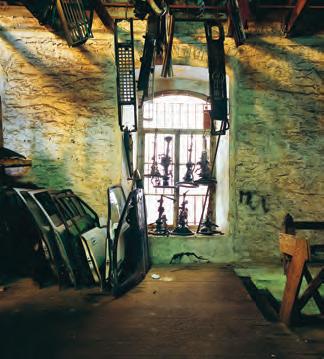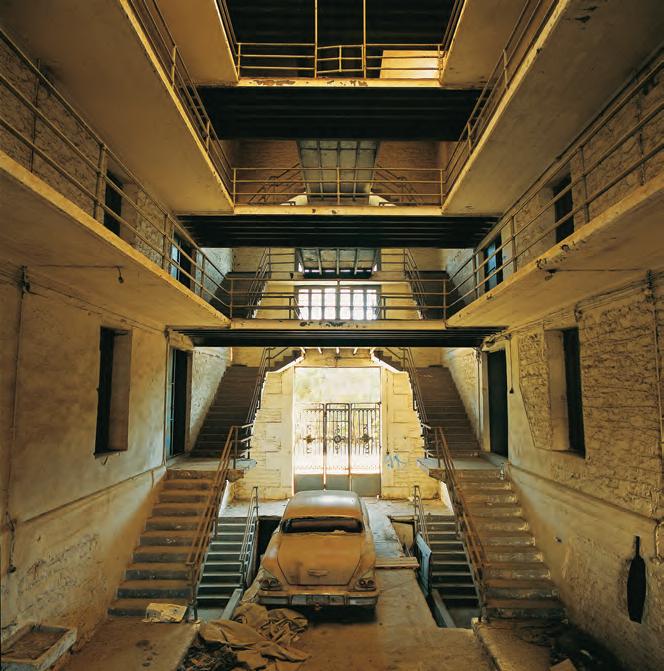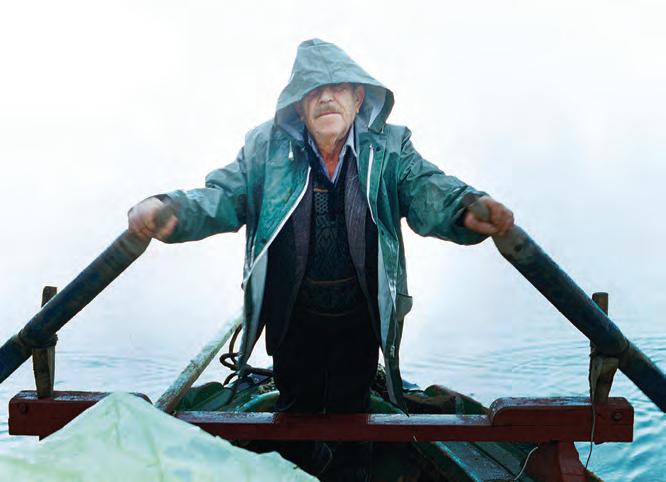
22 minute read
Country Guide Greece
from TWSM#7
Where to Work Country Guide Greece
The Enduring Paradox
Advertisement
Greece finds itself engulfed in a financial crisis that has exposed decades-long tax evasion and a bloated civil service. Businesses have also been saddled with hefty taxes to help pay off not one, but two international bailouts. But as the most successful companies show, there is life after debt.
By THRASY PETROPOULOS
As news editor of a weekly newspaper in Greece, I found myself in the plush and manicured offices of the Stavros Niarchos Foundation on the afternoon of June 29. Taking center stage was the acclaimed Italian architect Renzo Piano who, to the sound of classical music, was eloquently and calmly recounting the inspiration behind his plans for the state-of-the-art opera house and national library to be built on what is currently wasteland just north of the port of Piraeus. The 570 million euro project, he explained, is being funded exclusively by the foundation set up by the Niarchos ship-owning family and will be unveiled in 2015. Around half an hour – and two metro stops – later, I surfaced in central Athens’ Syntagma Square where all hell was breaking loose. Riot police were hurling tear gas grenades at swarms of screaming protesters, who had gathered to let the politicians know what they thought of the latest round of austerity measures being discussed that very moment in parliament only a matter of meters away. That evening, Greece was the leading story on most news programs around the world. Two very different images, both very much part of Greece – and a perfect example of the country’s enduring paradox. For the three decades since it joined the then European Economic Community, Greece has often been referred to as a poor country inhabited by rich people. Though the Niarchos family are hardly representative of the wider population (even by ship-owning standards, they constitute the super elite), there is truth that low basic salaries are often
Ionnina Igoumenitsa
Greece
Trikala
Thessaloniki Thasos Myrina Larisa Volos
Fanari Karditza
Europe
Lefkada
Arta Preveza
Agrinio Alyros
Lamia
Paliki
Argostoli Nefpaktos
Mesolongi
Patra Chalkida
Amaliada
Pygros Korinthos Athina
3,000 Islands
That make up 15% of the territory
Tripoli
Kalamata Sparti
Gyteio
Voies Ermoupoli
Paros Naxos
Tourists/year
17.5 million contributing 15% to the nation's GDP Population 10.7 million
Thira
counterbalanced by the amount of cash swirling around the black economy. The country’s vital statistics make gloomy reading: by the end of the year the projections are for unemployment to have passed 17% and the economy to have shrunk by 3.7%, and the national debt is over 360 billion euros and - most worryingly - is running at more than 150% of GDP. There is, however, another side to the coin. Despite the much publicized violence on the streets and long sequence of public and private sector strikes that have disrupted airport and transport services for more than a year since the country secured the first of two international bailouts, more than four million tourists arrived in Greece up to July. The turbulence across North Africa and recent bombings in Turkey have seemingly played into Greece’s hand. And although tourists are holding on to their wallets more tightly than ever, it is a clear message that the doom and gloom scenarios should be placed at an exaggerated end of the scale. Within the business and commerce community there is justified concern that the tax-heavy austerity measures are suffocating chances of growth. But there is also a recognition that reforms are absolutely necessary and a quiet confidence that the well-run, honest businesses will endure. A survival of the fittest, if you like. Or perhaps: a survival of the leanest.•
In Greece, a country with 200,000 km of coasts and a Mediterranean climate, the conditions are ideal for the growth of each form of fishery, coastal and open sea.
Thus “I followed Mr. Niko, a fisherman from that region and I tried to capture certain moments of his daily work that are interwoven with his life,” says the photographer Nikos Papathanasiou. A life surrounded by water, without schedule and without guaranteed income like the jobs of
02
the people from the city. For the
fishermen of the region their boat is also their home and they live in conditions that are seen as difficult
and obscure by others. As the prawn comes out to hunt food very early in the morning, the fisherman have to be ready by sunrise in order to catch them and save some time to spend with their families.
01 Going to work 02 Checking the opportunities 03 Tools of the trade
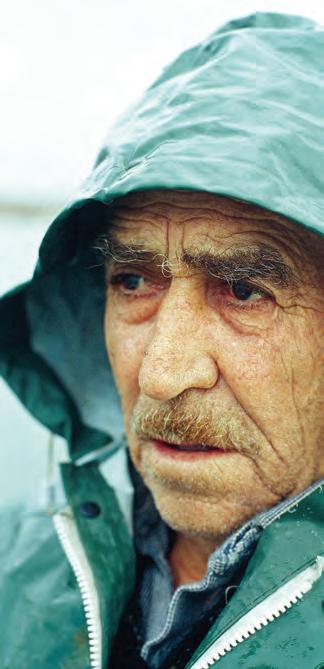
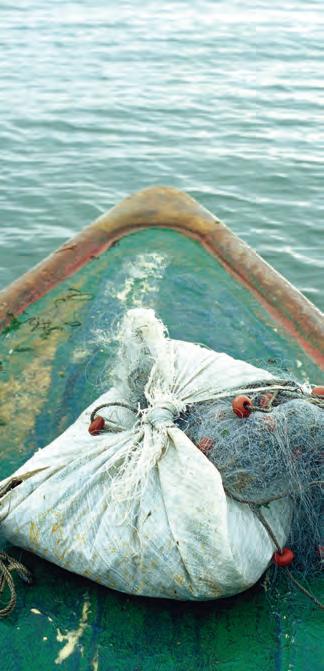
01
03
The Greek List
of Best Workplaces
By Dimitris Ganoudis Great Place to Work@ Institute Hellas, General Manager DIMITRIS GANOUDIS
People understand that the financial situation has changed things. Money is not the main element, trust is. The best workplaces aren’t based on salaries and benefits. It is true that the companies that make our list don’t pay badly. But we have a lot of companies that pay very well that didn’t make the list. What we have always observed is that trust and authenticity of the relationship between the staff and the management is the key element to a successfully run company. Trust is fragile and more important than ever during a time of economic difficulty. People appreciate the efforts of a company that keeps people on. And even if you have to lose staff – because a lot of the companies we feature have over the past year – well, people just want to know that it was handled fairly and that the staff in question were respected and possibly helped to find a position in another company. At the same time, employees are more flexible in relation to their salaries. What we have found is that many of the companies that made the Great Place to Work Hellas top ten list in each of the categories under and over 250 employees also had to layoff staff. That means the employees realized it wasn’t possible for the company to keep all its staff but that they made the right choices. The trust and openness was there. Decisions were justified in the minds of employees and there is a perceived clarity and openness of decisionmaking. This is my eighth year as general manager. I can say that there isn’t much that is different about successful companies in Greece and successful companies elsewhere. At first, a lot of companies approached us just to make the list. But, through working with them, they realized that it is very important to pay attention to their internal structure. The best companies became better. It’s not always the case, but the happiest companies tend to have the best results.
2011 Best Workplaces Greece
Over 250 employees
01 Athenian Brewery 02 Elais – Unilever Hellas 03 Tasty Foods 04 Ygeia Hospital 05 Media Strom 06 Pharmathen 07 Leroy Merlin 08 Würth Hellas 09 Vivechrom 10 Accenture
50-250 employees
01 Xerox Hellas 02 Kri-Kri, Milk Industry 03 Imperial Tobacco Hellas 04 Medtronic Hellas 05 Genesis Pharma 06 Data Communication 07 3M 08 Melissa Kikizas 09 Amgen Hellas 10 British American Tobacco Hellas
Great Place to Work® Institute Hellas
Panormos 74 115 23 Athens T +30 210 6971098 F +30 210 6985810 [W greatplacetowork.gr]
Copying the Successful Models
Dimitris Dondas, the HR director at Xerox Hellas, recalls the time when the document technology, services and software provider’s parent company sent in the auditors. It didn’t matter that the business had been in operation as a subsidiary of Xerox Europe for close to 40 years. “They saw Greece at the top of the news all year and were hearing stories about how the country manipulated data and statistics,” he said, “At the same time, the internal and external audits we were supplying them were great. They sent us a surprise audit – again external auditors – who stayed for two weeks and went through our books deeply. And they found nothing. The Xerox CEO herself called and said ‘congratulations’.” Not that the outcome came as a surprise. Xerox Hellas, a tightly run operation of around 140 staff, was this year voted top of the GPTW Hellas list of companies with between 50 and 250 workers, the result of a survey of staff members on how they rate trustworthiness, respect and management practices within the workplace. The year wasn’t without hurt, of course. But that’s the point. “Last year was challenging,” recalls Dondas, “Two years ago we had to communicate bad news. First of all this involved cutting jobs. It was extremely limited – 2 or 3 people – and it was our last resort. We explained to the staff how we were going to take the action, who would be involved … and we explained why. We had a very disciplined communication process, and there were of course many other streamlining measures taken. By involving the staff in the discussion, they shared the process. And we asked their opinion. Greeks tend to have extreme feelings, both in happiness and sadness. We didn’t want to panic them. We also told them it wasn’t our intention to cut salaries, even though the management team saw a reduction in their salaries for a period of time. But when the crisis hit us we had no fat. It saved us from
01 Dimitris Dondas, HR director at Xerox Hellas. The Xerox Hellas started in 1972 and since then leads the Greek market in the streets of technological developments with innovative products, technologies and modern ways of Quality Management. Featuring the most comprehensive and innovative equipment and software to manage and produce documents and a wide range of services including consulting, document imaging, content management services and outsourcing. It employs 130 people, trainees in all areas of products, services and administration. The environment is one of XEROS primary concerns, the company addresses every aspect of its business in a responsible manner to help protect the environment. [W xerox.com]

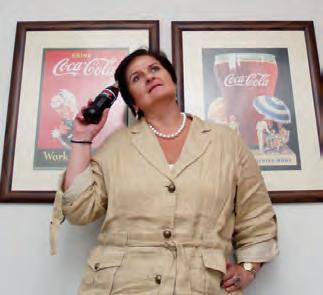
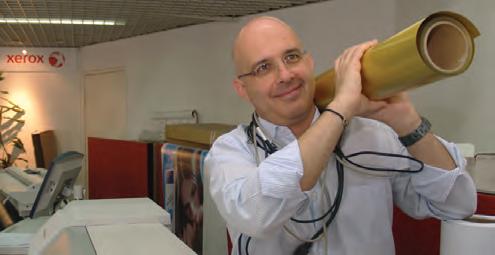

02 Venetia Koussia, managing director of the employment services subsidiary Manpower Hellas. Manpower is a world leader in the workplace. In Greece, with service offices in Athens and Thessaloniki, the company offers a full range of employment services, helping more than 2,000 employers and 10,000 workers to find the solutions for them. [W manpowerteam.gr]
05 Paschalis Economides, institutional equities sales trader at Jefferies & Co. Jefferies provides North American, European and Asian institutions and corporate clients with a broad range of U.S. and international products and services across a range of industries. The company pairs a client-first approach with a regionally-focused sensibility. Jefferies is committed to serving the needs of a growing client base wherever they do business. The markets and their clients know no geographic boundaries. [W jeffereies.com]
06 Elias Angelakos, commercial director of ship management company Angelakos (Hellas). Angelakos is a 5th generation shipping management company, it is headquartered in Athens, although it was originally started in England and then relocated to Greece 15 years ago. The company counts 25 staff members. 03 Vicky Bouzouki, Country HR Director of CCHBC. Coca Cola HBC was formed in 2000 as a result of the merger of the Athens-based Hellenic Bottling Company and the London-based Coca-Cola Beverages. Coca-Cola Hellenic is headquartered in Athens and currently listed on the Athens, New York and London stock exchanges. Our two major shareholders are the Kar-Tess Holding S.A., a private holding company, and The Coca-Cola Company. In conducting operations across 28 countries, Coca-Cola Hellenic provides guidance, support and supervision to each operation while placing day-to-day management and operation in the hands of local employees with a deep familiarity of their own country, its business practices and community aspirations. [W coca-colahellenic.com]
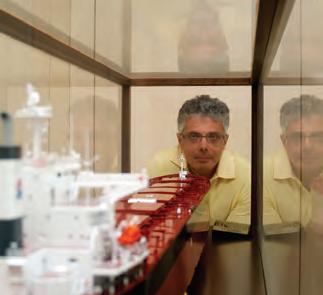
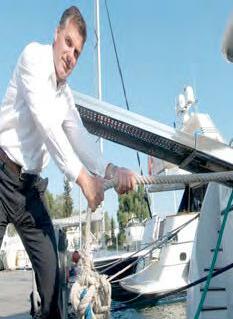
04 Ketty Hatzianagnostou, Imperial Tobacco Hellas’s HR manager. Imperial Tobacco Hellas was created in 2003 and is a member of Imperial Tobacco Group, a leading international tobacco company which manufactures, markets and sells a comprehensive range of cigarettes, tobaccos, rolling papers, filter tubes and cigars. With sales in over 160 countries, the company has a strong international profile. Imperial Tobacco Hellas is the center of Group activities in the South Central Europe region, responsible for four additional markets apart from Greece: Bulgaria, Romania, Cyprus and Malta. The company’s brand portfolio includes well known brands as Davidoff, R1, Slim Line, Gauloises, Maxim Slims, West, John Player Special, as well as Drum, Golden Virginia and Rizla. [W imperial-tobacco.gr]
making unpleasant decisions later.” He also stresses that the often exaggerated press coverage isn’t helping: “I went into downtown Athens to have a look on a day there was trouble. It wasn’t pleasant but it wasn’t downtown Baghdad or Tahrir Square either. A few blocks away life was continuing as normal.”
WANTED: LEADERS
There is, however, nothing normal about surveys which periodically show that the majority of young Greeks are considering leaving the country. The OECD puts unemployment of under 30-year-olds in Greece at over 35%. Venetia Koussia, managing director of the employment services subsidiary Manpower Hellas, has a front seat view of the problem and is straight-talking about the cause. “Definitely, in Greece, we have a social and cultural problem which has led to a financial problem,” she says, “But the financial problem is the cherry on the cake. And none of this started as a problem. It started 30 years ago as a way of life and has evolved as a problem where we are now producing virtually nothing, we are abandoning the farming sector and we are providing very expensive services without added value. We have a leadership crisis in Greece.” She is optimistic, however, that the worst is over as far as private-sector layoffs. “The positive thing is that 69% of the companies interviewed [by Manpower Hellas] are not hiring or firing,” she says. “We are reaching a plateau. We are seeing opportunities in the insurance sector and in companies involved in sales and finance, and business-tobusiness services … the intermediaries.” And she has a word of warning to those thinking of leaving the country. “You should ask yourself why you think you’ll succeed abroad and not here. In my opinion candidates need to be more flexible here. It is not heaven out there and hell here.” Putting the fizz back into the economy Moreover, it is easy to overlook the success stories. Coca-Cola 3E has been operating in Greece for 42 years now, and not only as an employer of more than 2,000 staff, with a wide-ranging presence across the soft drink, water, fruit juice, tea, coffee and snack market as part of Coca Cola Hellenic Bottling Company (CCHBC). The multi-national arm, Coca Cola Hellenic, stretches to 28 countries and employs more than 41,000 people. It is the largest company listed on the Athens bourse, valued at 6.2bn euros. The second largest bottler of Coke in the world, Coca Cola HBC has suffered its share of a falling market, reporting losses of 1m euros during the first quarter of the year in May. Increasing commodity prices were the primary reason given for the decline. And the impact of a hike from 13 to 23 percent on VAT on all fizzy drinks included in the latest austerity package will likely hit hard. It is, however, the company’s impact on the local economy over four decades that Vicky Bouzouki, Country HR Director of CCHBC, stresses. As well as running eight production plants in Greece, it sources most of its raw materials for local suppliers and each employment position in the company is estimated to 17 jobs in the production process beyond. And she insists that rather than allowing the guillotine to fall, there is more mileage than ever before to employers’ looking after their staff. To that end, the belt-tightening measures have been limited to seeking costs reductions wherever possible (teleconferencing over travel and recruitment, management pay freezes, etc.) rather than shedding jobs involuntarily. “With the shrinking of the economy, most companies are unfortunately being faced with tough decisions,” she says, “Many companies choose to cut expenditures but inevitably the tough decisions involving employees must be dealt with. We acknowledge that it is precisely during these scenarios that companies need to accelerate their humane approach. People are the most important capital in any company. The incorporation of social criteria in all our decisions in nowadays king for our sustainability.” It was, Bouzouki says, the company’s policy of offering its staff “candid information, clarity in communication and transparency” that saw it top the Great Place to Work Hellas lists for companies with over 250 employees in 2009 and 2010.
PUT THAT IN YOUR PIPE AND SMOKE IT
If there is one habit Greeks are unlikely to give up in these austerity-driven times, it is the national pastime of smoking. And just as Coca Cola recognizes the geographical advantage of operating out of Greece, many other companies continue to do the same – among them Imperial Tobacco Hellas. A subsidiary of the Imperial Tobacco Company, has covered South-Central Europe (Greece, Cyprus, Malta, Bulgaria and Romania) for the past 30 years and enjoys an almost 12 percent market share. Its brands include Davidoff, Slim Line and Gauloises, as well as Drum, Golden Virginia and Rizla. “Over the last two years, the tobacco industry has faced a tremendous pressure following a number of excise tax increases coupled with two VAT increases. This, in combination with the overall economic crisis, has resulted in a significant reduction of the market volume and new consumer trends. Turning to cheaper or roll-your-own brands, for instance,” explains Ketty Hatzianagnostou, Imperial Tobacco Hellas’s HR manager. She goes on to stress that Imperial Tobacco Hellas has not only been able to defend its position but sustain its market share. Not coincidentally perhaps, it is also a company that has been recognized for its sound business and management practices. As well as receiving marketing and sales excellence awards, it too has been rewarded with an esteemed People Management Award and was also among the 2011 Great Workplaces. It is another example, Hatzianagnostou says, of why good human resources management is more important now than ever before. “We are facing higher taxes and longer working lives and their consequence – recruitment freezes and high unemployment,” she says. “We support our people by keeping their morale high by whatever means possible. It’s crucial to offer them a sense of security, offering flexibility and alternatives where possible. We also continue to invest in our people and take care of them by providing private healthcare programs for them and their families. Such actions help minimize the negative impact and improve not only the effectiveness of our people but also our competitiveness.” Respect and equal treatment are the key, she says, as is an open communication policy. “As a matter of fact, we have increased our personnel [now 100] despite the difficulties and negative market trends and we have over the past two years given salary increases and full bonuses, and maintained the company’s benefits.”
THE FINANCIAL ANALYST That is not to disguise the fact that the general trend is downwards. And no business can sustain losses indefinitely. The country’s black market is estimated to be as much as a third of its gross na-
tional product, costing upwards of $20 billion a year (according to Transparency International), the product of chronic tax evasion. There are those, though, who believe that less taxation would be a better strategy to follow. Paschalis Economides, an institutional equities sales trader for more than 20 years at the US Investment Bank Jefferies & Co (seven of them as the managing director of the southeastern region of the US) before moving to Greece, offers a blunt appraisal of the government’s fiscal plan. “The measures will not work,” he says. He explains, “Very simply, an economy that is in recession needs tax cuts to start growing, not tax increases. As the recession worsens the tax revenues will probably diminish further. The high tax rates will serve as a catalyst for even more tax evasion in VAT transactions.” The annual personal exemption tax threshold of 12,000 euros is, he says, too high – “much higher than the US and about three times that of Germany” – and the higher-rate taxation kicks in far too low (40% for earnings over 60,000 euros a year). Unemployment, he adds, has further to rise and will be the principal problem over the next decade and the government needs to deliver on its obligation on privatizing 50bn euros worth of state assets by 2015 – or at least making a serious go of it. “The state has done a horrible job at running these enterprises as the government does not innovate or run the business for profit but rather for political interest and party favor,” he says. Within all this, however, there are undoubtedly opportunities for the shrewd investor: “As an investor, I have personally looked into the two most visible defaults of the past 15 years – Russia and Argentina. I examined the performances of two very basic companies, telephone operators Mobile Telesystems, in Russia, and Telecom Argentina. The former hit a low of $2.11 in 2000 and reached $42.31 in 2008 and the latter went down to $0.60 in 2002 and had a high of $29.26 just five years later. As strange as it may sound, such opportunities are in the making here. Greece has a competitive edge in tourism, logistics, and upscale retirement communities focusing on Mediterranean living, healthcare, lottery games and, of course, in renewable energy.”
IT’S NEVER PLAIN SAILING Missing from those sectors is the one
I Don’t Have Email. It Wastes Time
Manolis Grigoreas, a talented painter born in Piraeus, Greece in 1952, lives a very quiet and peaceful life. Since 1992 he has lived in Monemvassia, a small town in Southern Greece, where he paints and likes to keep to himself. Once, Grigoreas was approached by a tourist who requested his email address, his response was “I don’t have email. It wastes time.” In March 2006, he opened his own space, the Malva Gallery in Monemvassia to exhibits his private collection of work. Grigoreas is a self-taught painter and he exhibited his work in Athens, Thessaloniki and London. Currently his paintings hang in Greece and abroad in private collections. His technique is quite distinctive. It is called a micrographic technique. He is also known for his use of colors and china ink on millboard; a thick paper also containing cotton fibers. This results in a type of dry watercolor. The bright colors are brought out by the use of the china ink. The finishing touch for his paintings is the contour reminiscent of old embroideries. This approach gives painstaking detail and can also, at times, be dizzying in its detail. A critic of Grigoreas described his work as “a flame of fire,” which was inspired by ancient Greek traditions carried through to modern day. In the case of the painting featured here, Cretan Father and Daughter, 1999, Grigoreas created the piece using colored pencils and instead of his usual China ink, he exchanged in Indian ink. Credit: Cretan Father and Daughter, 1999 (coloured pencils & indian ink on millboard) by Manolis Grigoreas (b.1952). Private Collection/ Malva Gallery/ The Bridgeman Art Library

He Smokes Like a Turkish ... or as a Greek?
In September 2003, Kamilo Nollas started a project that would lead him through Northern Greece to photograph what the locals referred to as “kapnomagaza”, otherwise known as cigarette factories. Every new factory was an exciting mystery to him with vast, echoing walls
and high-ceilinged spaces. He could feel how these places played such an important historical role in the economic culture of Greece. [W kamilonollas.com] in which Greece already has a healthy competitive edge – shipping. Greek ship-owners spent some $11bn on ship purchases in the first half of 2011. However, it will not have escaped the EU-IMF inspectors that, while the pips are being squeezed out of every other sector, shipping still enjoys significant tax perks. Income earned worldwide is not taxed. There are those who predict this will change. Ship owners have not been shy to answer that, if it does, they will simply move to more tax advantageous parts of the world: Singapore, Geneva, Monaco or elsewhere. Elias Angelakos, commercial director of ship management company Angelakos (Hellas), has succinct way of explaining why: “Shipping companies earn their money abroad and spend it in Greece. They pay their lawful taxes; should the tax regime change, companies would have to consider their options in order to remain internationally competitive, which would mean moving all or part of their operations abroad. It is doubtful it will change, because it will be detrimental to the Greek economy.” He adds, “Directly or indirectly, shipping employs a significant part of the local workforce. It is where the country excels internationally.” Angelakos (Hellas), a fifth-generation company with seven bulk carriers and 25 staff in Athens, was established in England and relocated to Greece 15 years ago. It is a move that Angelakos does not regret. “In the past the country was more isolated. Its activities were taking place out of London or New York. Things have changed. Greece has become more of a shipping centre. And not just Piraeus, the northern and southern suburbs of Athens too. There is more personal contact with lawyers and underwriters in Athens. Some London brokers now have representation in Greece. Telecommunications are so much easier than they used to be.” He adds that the way of life is better, too, despite the current difficulties. In order to provide relief to the employment situation, the government should, he says, provide further training and encouragement for people to become seafarers. “Seafaring is a profession that is exciting, lucrative and eye-opening, as well as an exercise in character-building,” he says, “The main asset of a country is not its financial or physical resources, it is its human resources.” •

